Business
California’s wealthiest farm family — and scores of their workers — accuse UFW of bait and trick
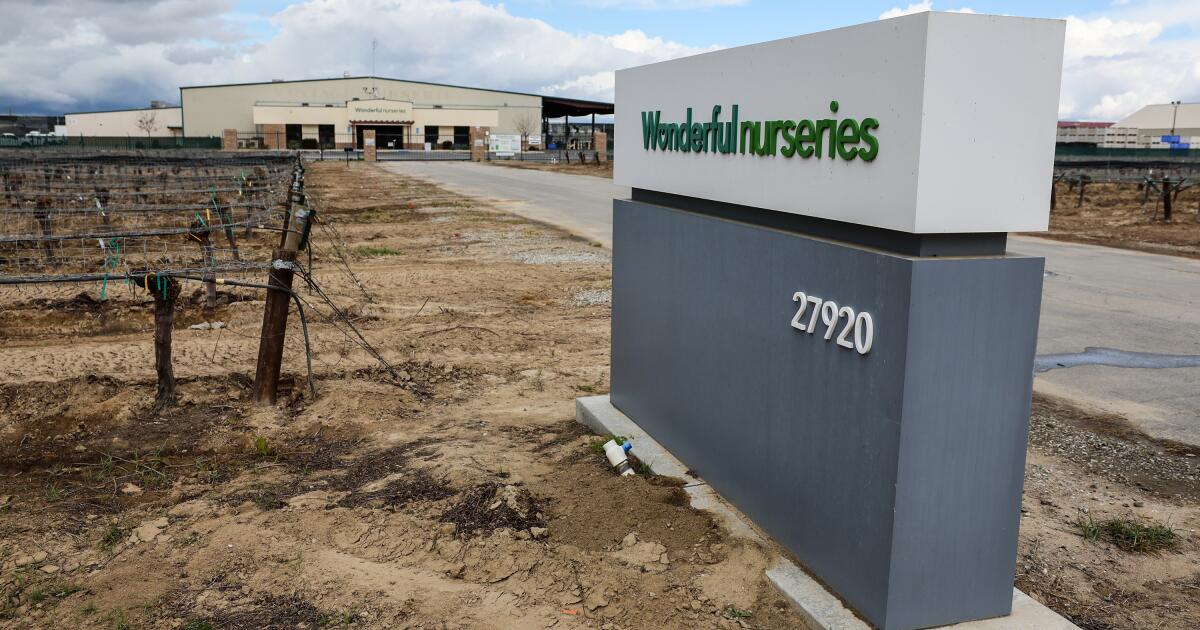
The revelation that United Farm Workers would be representing workers at a Kern County company owned by the state’s wealthiest farming family should have been a triumphant moment for the storied union co-founded by Cesar Chavez and Dolores Huerta.
Following decades of diminishing membership in the vast stretches of California’s farm fields, the UFW had seized on a new way to unionize workers, made possible by recent state legislation. Rather than hold a formal election at a company job site, union leaders had invited employees at Wonderful Nurseries, the nation’s largest grapevine nursery, to off-site meetings where they were instructed in how to apply for $600 in federal relief for farmworkers who labored during the pandemic, as well as encouraged to sign cards authorizing the UFW to represent them at Wonderful.
Labor experts say the outcome of the UFW-Wonderful skirmish could have outsize ramifications on the future of unionizing farmworkers in California.
(Max Whittaker / For the Times)
The UFW subsequently filed a petition with the Agricultural Labor Relations Board, asserting that a majority of the 600-plus farmworkers at Wonderful Nurseries in Wasco had signed the authorization cards and asking that the UFW be certified as their union representative. It appeared to mark the UFW’s third victorious unionization drive in a matter of months.
But within days, Wonderful — part of the farming empire owned by billionaires Stewart and Lynda Resnick — hit back with an explosive allegation: The company accused the UFW of using the $600 in federal relief as bait to trick farmworkers into signing the authorization cards. And it submitted nearly 150 signed declarations from nursery workers saying they had not understood that by signing the cards they were voting to unionize.

Stewart and Lynda Resnick in a 2016 portrait
(Ryan Miller / Getty Images)
Claudia Chavez, a full-time employee of a labor contractor for Wonderful Nurseries, is among several workers who told The Times that they attended meetings where they understood that the UFW would help them claim the $600. She said she was given a card to sign, but didn’t know that signing it was a vote for the union.
“They said clearly — this I do remember — that it was $600 of aid for farmworkers who worked during COVID,” Chavez, 43, said during an interview outside her Wasco home. “But they never said, ‘If you sign, we’re going to come to your work.’”
Union leaders have stood their ground, alleging that the company intimidated workers into making false statements and brought in a labor consultant with a reputation as a union buster to manipulate worker emotions in the weeks that followed.
Antonio De Loera-Brust, UFW’s communications director, called the allegations that workers were tricked into signing union cards “categorically false.” The union has put forward other workers who said they understood what they were signing and believe that UFW representation would improve their pay and working conditions.
Still, what could have been a David-versus-Goliath tale has become something tangled and far more troubling. The UFW and Wonderful are locked in battle, each employing legal muscle and PR prowess, and will present their cases to the ALRB, the state agency charged with overseeing farm labor disputes and union elections.
Labor experts say the outcome could have outsize ramifications for the future of unionizing farmworkers in California. Though still an influential voice in Democratic leadership circles, UFW has seen its on-the-ground presence and sway plummet from its vibrant heyday in the 1960s and ‘70s. At its peak, UFW had about 80,000 members across hundreds of farms. Today, that number has fallen to about 5,000, with another 2,000 in the Teamsters or United Food and Commercial Workers International unions.
If Wonderful is found to have engaged in unfair labor practices, it could be subject to financial penalties. But if the union is found to have misled workers, it faces a blow to its credibility and its nascent resurgence could be stopped in its tracks.
“One way or another it’s going to have an impact on the ability of farmworkers to organize,” said Gaspar Rivera-Salgado, project director at the UCLA Center for Labor Research and Education. “If the union fails and it’s a setback to the organizing, it’s going to be a long while before they can find a foothold to fight for farmworkers in California.”
The UFW-Wonderful skirmish is in some ways an outgrowth of a longer-running clash between labor leaders and California’s powerful agricultural interests over the UFW’s efforts to streamline the unionization process.
For years, UFW leaders had argued that the process for unionizing work sites was stacked against them. Before the new system went into effect, farmworkers voted for union representation by secret ballot at a dedicated polling event, typically held on company grounds. The UFW contends that left workers vulnerable to employer intimidation.
In 2022, Assembly Bill 2183 sought to allow farmworkers to select labor representation through mail-in ballots or a system known as card check, which allows workers to authorize a union by signing cards off-site rather than voting in-person at a designated polling place.
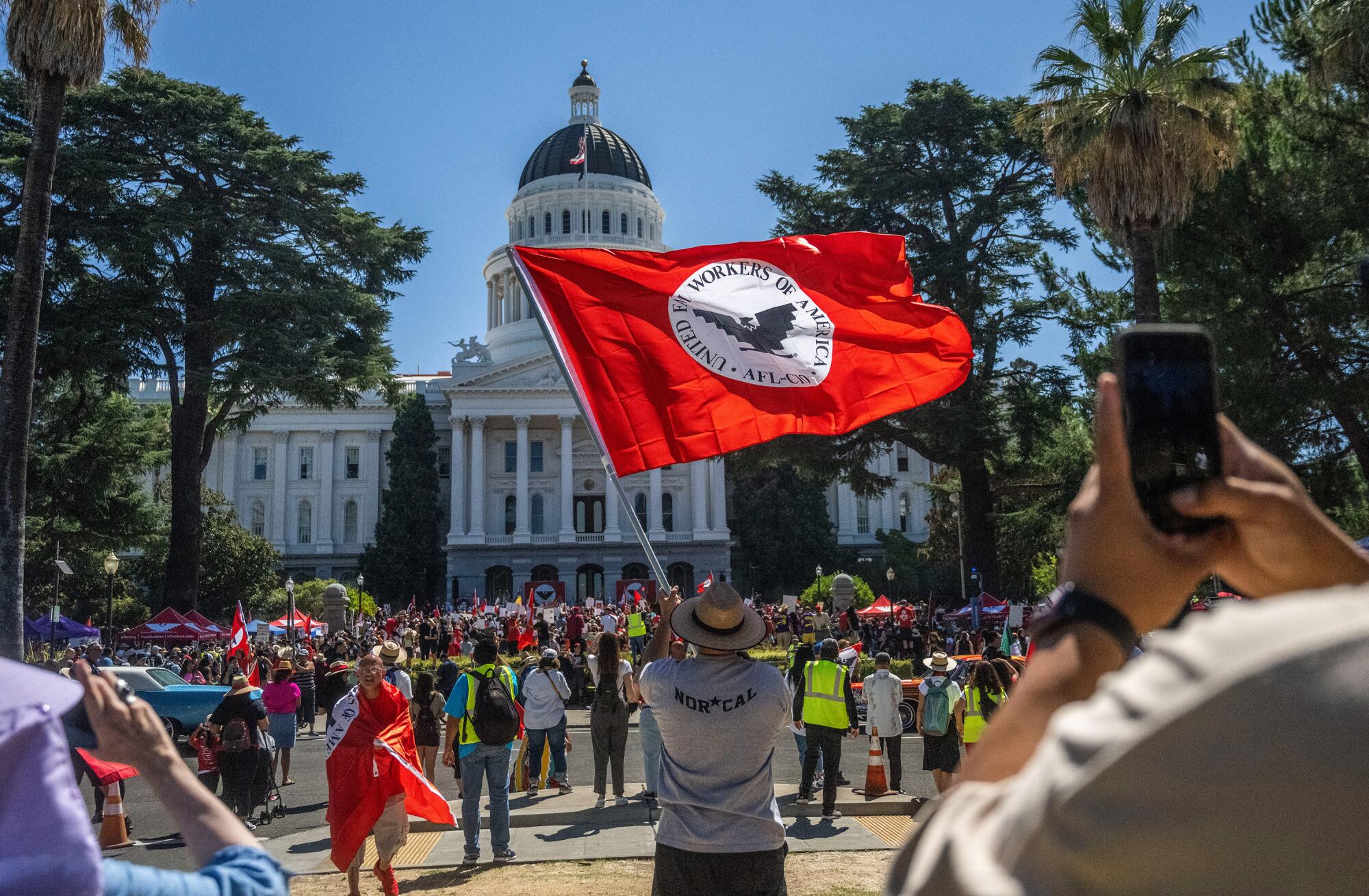
The UFW organized a 335-mile march to ramp up pressure on Gov. Gavin Newsom to sign legislation that would provide more avenues to authorize union representation at agricultural work sites.
(Hector Amezcua / The Sacramento Bee)
Gov. Gavin Newsom had vetoed a similar bill the previous year, citing concerns specific to the integrity of the mail-in balloting. His team signaled he would also veto AB 2183. But President Biden publicly exhorted Newsom to sign the bill, and the UFW organized a 335-mile march from Delano to Sacramento to ramp up pressure.
Newsom signed the bill, under the condition that it be amended to limit certain aspects. In 2023, the law was amended to remove the mail-in ballot option and cap the number of work sites that could be petitioned through card check to 75. It took effect Jan. 1, 2023, and will sunset in 2028.
Under the new system, a union can seek to organize an agricultural work site without notifying an employer. Once union representatives gather enough authorization cards to constitute what they believe is majority support, the union files a petition with the state labor board and the employer. The ALRB must decide whether there is proof a majority of the bargaining unit employees support forming a union.
But as is playing out in the Wonderful case, that process can be appealed.
From the start, the new system has been shadowed by a lack of specifics on the responsibilities of the union and employers in the card check drive. It has taken the ALRB 10 months to publish proposed regulations for the new law, and growers say they feel they’ve been playing a game with no rules.
UFW’s first certification petition under card check landed in Stanislaus County in September when it sought to represent 250 workers at DMB Packing Corp., also known as DiMare, where it won 51% support. DiMare submitted several objections, including an allegation that the union obtained signatures through “fraud” and “coercion.” The ALRB found the allegations lacked evidence.
Guadalupe Luna, 55, said working conditions at the tomato packing company in Newman were miserable — that they had no health benefits, no paid time off and got paid 77 cents for every bucket of tomatoes collected. Before Luna arrived at the farm about a year ago, he said, he worked on a farm in Firebaugh where the UFW represented workers and they received benefits and better pay.
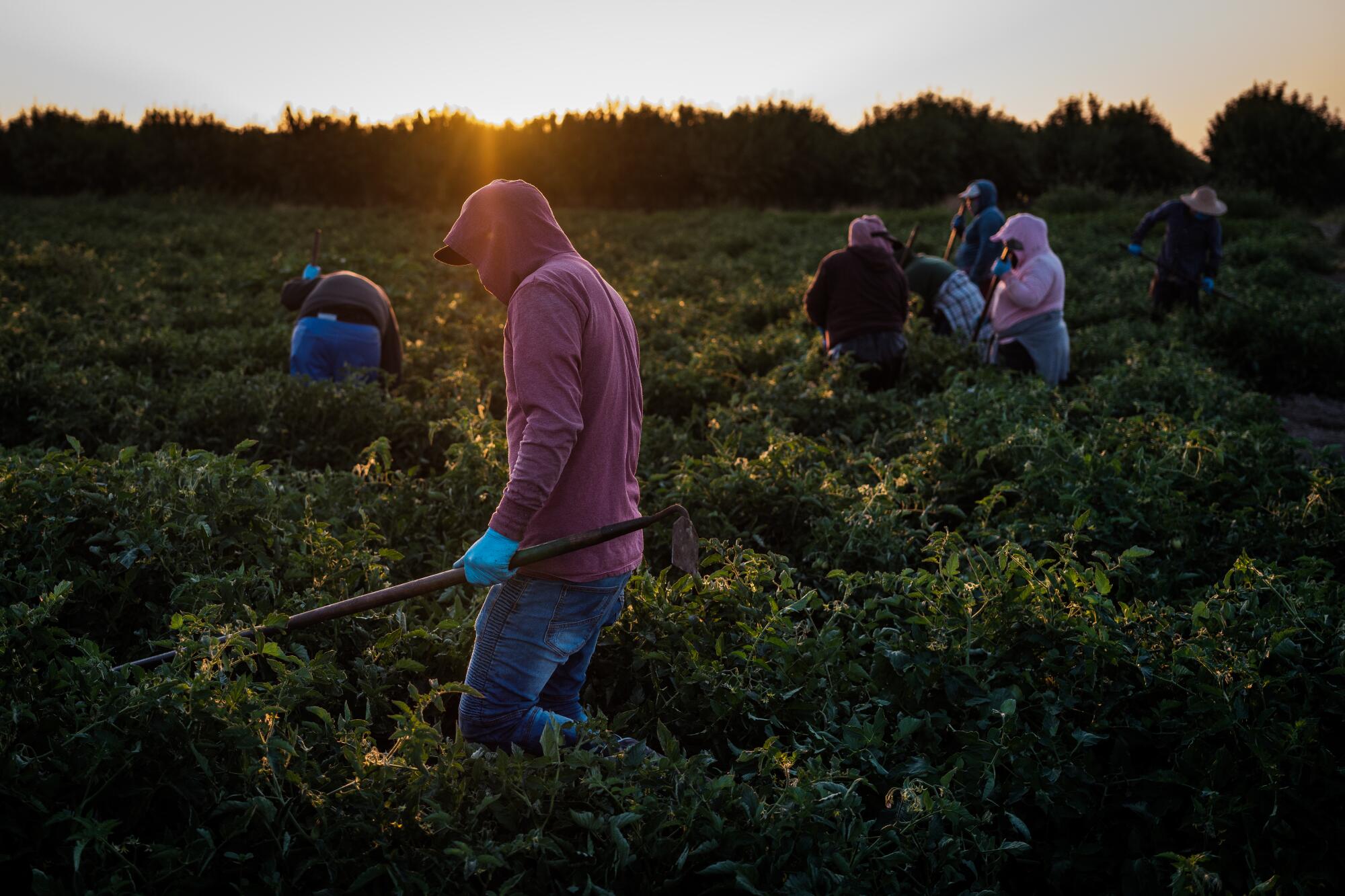
Though still an influential voice in Democratic leadership circles, the UFW has seen its on-the-ground presence plummet from its vibrant heyday in the 1960s and ‘70s.
(Max Whittaker / For the Times)
Luna, who is on the bargaining committee for the union, said the UFW meetings he attended with co-workers were focused on the benefits of unionizing and did not include conversations about the $600 federal relief payments. “The coworkers I spoke with, we talked and there wasn’t that [confusion].” he said. “We just talked to them and explained the process.”
DMB Packing President Jeff Dolan said the company is appealing the labor board’s decision. Nonetheless, he said, negotiations with the UFW and workers have been “cordial and positive.”
In Fallbrook, 50 miles north of San Diego, the UFW submitted a petition in January to represent more than 70 employees at Olive Hill Greenhouses. According to the ALRB, no objections were filed, and both sides are at the table to negotiate their first contract.
Santiago Hernandez was among those eager to unionize workers at the Fallbrook nursery. He said he told colleagues to talk to a UFW organizer and explain what they wanted out of their jobs and decide if they wanted to support a union.
The first meeting, he said, was about starting a union and they received the authorization cards to consider. He said the last meeting he attended, where people could drop off the cards, also allowed people to sign up for the $600 in relief. He did not hear from colleagues about being tricked, he said, and felt it had been clearly communicated that the two were not linked.
“The union is here to help farmworkers, not to screw with farmworkers,” Hernandez said.
One of the largest employers in the Central Valley, the Wonderful Co. prides itself on its treatment of farmworkers, including paying above minimum wage and extending company benefits — like free use of its health centers and gyms — to full-time employees. Wonderful has also invested millions of dollars in farmworker communities in Kern County, building parks and schools and improving infrastructure.
The Resnicks, owners of FIJI Water, Wonderful Pistachios and POM Wonderful, are major political donors who have contributed more than $220,000 to Newsom’s campaigns alone.
The workers at Wonderful Nurseries’ sprawling complex in Wasco tend to wine and table grapevines and nut tree rootstocks. In both the company and union narratives about the card check episode, the workers have been portrayed as pawns in a much larger game. The divergent narratives offer little room for a middle ground, for example whether there could have been some confusion in the meetings because of a general lack of understanding of the UFW’s role.
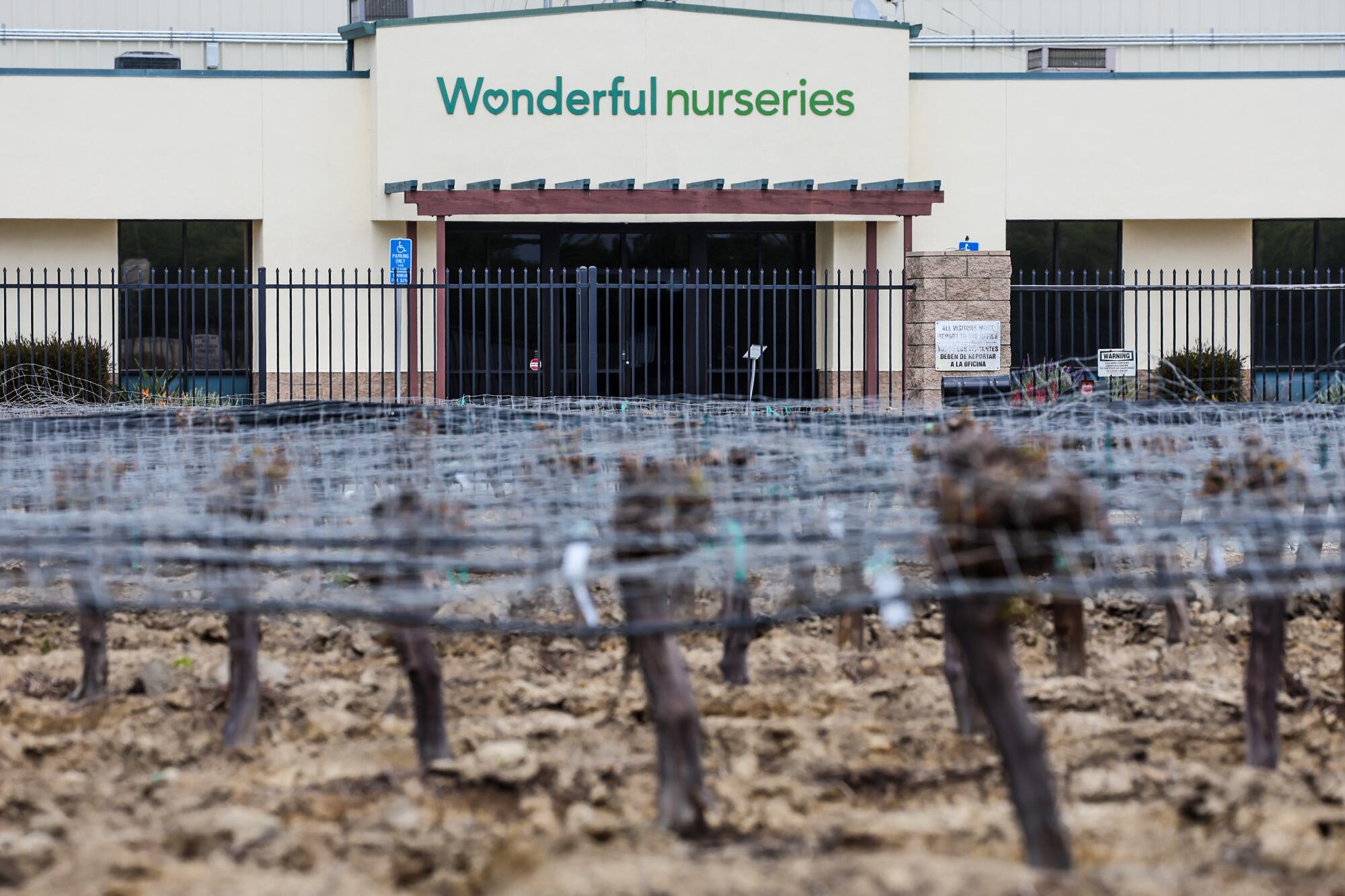
One of the largest employers in the Central Valley, the Wonderful Co. has invested millions of dollars in farmworker communities in Kern County.
(Robert Gauthier / Los Angeles Times)
There does seem to be general agreement that the organizing meetings for Wonderful employees incorporated discussion of both the federal relief payments and the unionization drive. The U.S. Department of Agriculture has authorized several organizations to distribute the one-time grants, including the UFW Foundation, which is separate from the labor union.
Rosa Maria Silva de Rodriguez, 40, who has worked at Wonderful Nurseries for five years, said she hosted several of the meetings at her home last year. She said she wants a union because she feels workers are being mistreated. The water provided in 5-gallon coolers was inconsistently refilled and cleaned, she said. She said she’s had uncomfortable situations in which male coworkers made suggestive comments about women and she knew of no avenue for reporting it.
Silva de Rodriguez said it was clear at the meetings that the federal relief money was not tied to signing a union card. The UFW representative “always talked about the rights of workers, what it meant to form a union, to bring in a union, what the union would do,” Silva de Rodriguez said.
Yet other workers interviewed by The Times spoke in equally heartfelt terms about feeling duped.
Maria Pedro, 27, makes $16.30 an hour as a seasonal worker for a labor contractor at Wonderful Nurseries. She likes that the work in the greenhouses is indoors — and therefore dependable, even when it rains.
“Look, I just got home, and I’m clean,” Pedro said on a recent afternoon, as she sat at a table in her work clothes, khaki-colored pants and a black, long-sleeved shirt.

The workers at Wonderful Nurseries’ sprawling complex in Wasco tend to wine and table grapevines and nut tree rootstocks.
(Robert Gauthier / Los Angeles Times)
She described attending a meeting last year at a colleague’s home in Wasco. She said a UFW representative was there to help Pedro and others apply for the $600 federal grant. As a single mother of three, the money would help her pay rent and buy diapers.
Pedro, who emigrated from Guatemala five years ago, said she had never heard of the union. But during the meeting, the rep explained that the organization helps farmworkers assert their rights. Pedro signed several documents. Among them was a white card emblazoned with the union’s eagle logo that reads, in English and Spanish, “I authorize the Union of Farm Workers of America to be my union representative to collectively negotiate an employment contract with my employer to improve my wages, working conditions and benefits.”
The union rep never asked if the workers wanted to join the union and didn’t explain the significance of the cards, Pedro said.
On Feb. 23, the UFW filed a petition with the ALRB to represent Wonderful Nurseries employees. Several workers, including people for and against unionizing, described attending meetings days later, led by an outside consultant, Raul Calvo, who has built a business advising farm companies on how to avoid unionization. The workers said Calvo told them about the union’s entrance into Wonderful Nurseries and that once the contract was ratified, 3% of their paycheck would go toward union dues.
Pedro said it was only then that she realized that, by signing the card, she had voted for the UFW to represent her. “Thanks to him, we understood what was happening, because the union never really explained what they did,” she said.
If her name was on the petition, Pedro said, she wanted it removed and asked Wonderful for help. She was among the workers who signed a declaration.
Silva de Rodriguez, on the other hand, contends Calvo was the first to suggest employees were tricked. She said workers began admitting to supervisors that they had signed the union card and faced pressure to renounce their support. She said she has seen workers who once supported the unionization effort now protest against it.
“It bothers me, but at the same time, it gives me a bit more strength, because I am fighting for something fair, something fair for everyone,” she said.
The union filed a charge against Wonderful Nurseries, alleging the company required workers to attend a “captive audience” meeting to urge employees to reject UFW representation. Wonderful Nurseries maintains it “provided interested employees with factual information about the process and their rights.”
Calvo confirmed to The Times he is working for the company but declined to answer questions about his role.
The ALRB acknowledged receiving worker declarations on March 1 and called the allegations “serious in nature.” Three days later, the regional director of the labor board moved forward to certify the union’s petition, determining the UFW had submitted 327 valid authorization cards from a bargaining unit of 640, establishing majority support.
The dispute crystallized last week when about 100 Wonderful Nurseries workers left work and traveled 60 miles north to the labor board’s Visalia office. They sported the orange safety vests they’re required to wear at work and carried signs reading, “We don’t want a union! Listen to our voices. Don’t ignore us.”
While the company and two participants who spoke with The Times were adamant the demonstration was worker-led, the UFW has filed a charge with the board alleging that Wonderful Nurseries coerced workers into attending.
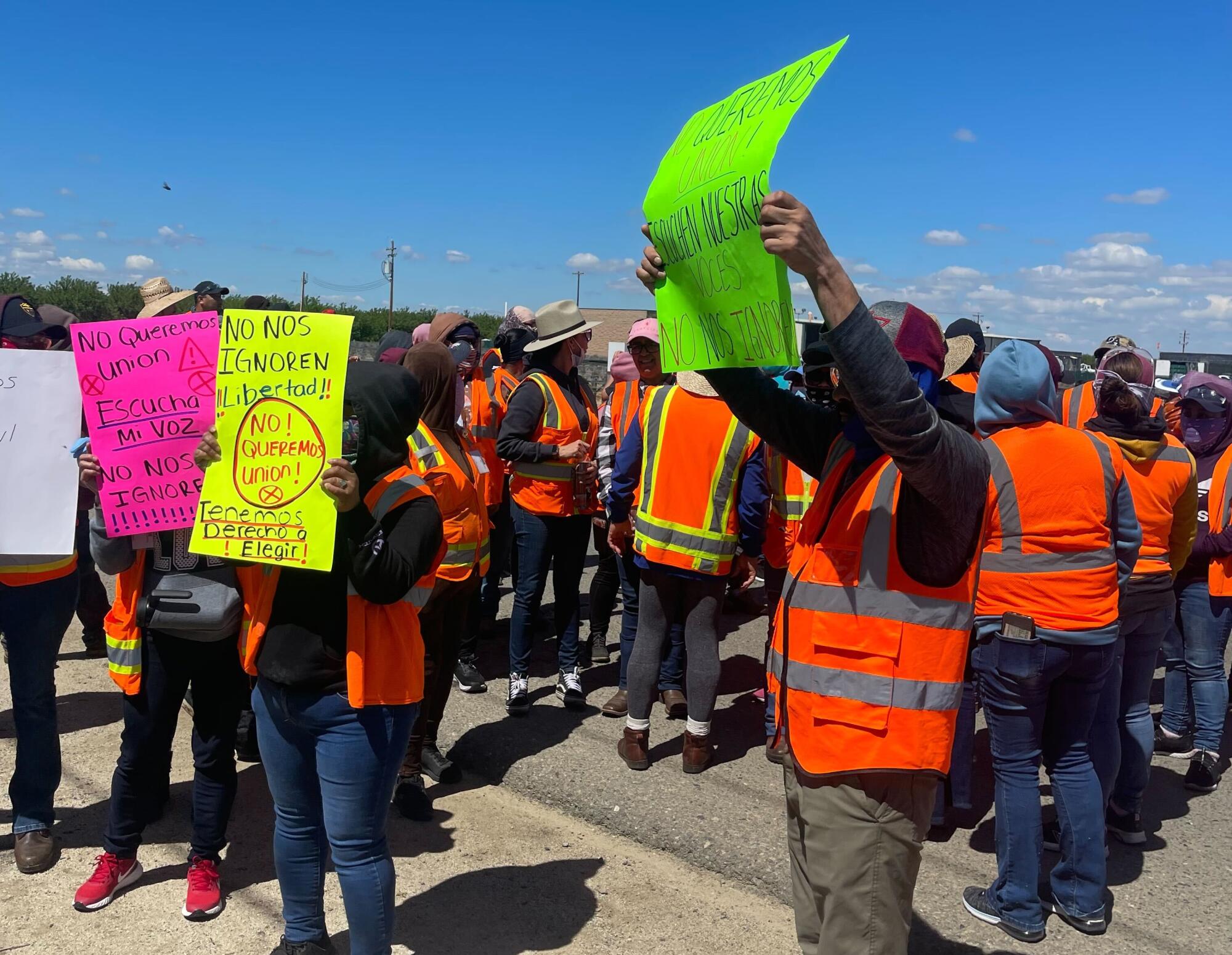
About 100 employees of Wonderful Nurseries who say the UFW used deceptive tactics in its unionization drive stage a protest at the Agricultural Labor Relations Board in Visalia.
(Courtesy of Claudia Chavez)
Last week, in yet another escalation, a Central Valley law firm that frequently represents the UFW filed charges with the state Civil Rights Department on behalf of seven workers, including Silva de Rodriguez, alleging that Wonderful Nurseries doesn’t provide sexual harassment training, resulting in a “hostile work environment.”
Wonderful fired back, dismissing the charges as “bogus claims.” In a statement, company President Rob Yraceburu said every manager, including those employed through third parties, is in compliance with all mandatory training, and that the company provided the UFW with its employee handbook, which includes its harassment policy, a week before the charges were filed.
“It’s getting harder to keep up with the fire hose of lies the UFW is pushing in their effort to divert attention from their fraudulent conduct in a vote decided by just seven votes, but where more than 150 farmworkers say they were misled,” Yraceburu said.
Wonderful has appealed the UFW certification. The state labor board is expected to meet this month to consider the company’s objections.
This article is part of The Times’ equity reporting initiative, funded by the James Irvine Foundation, exploring the challenges facing low-income workers and the efforts being made to address California’s economic divide.

Business
California led the nation in job cuts last year, but the pace slowed in December

Buffeted by upheavals in the tech and entertainment industries, California led the nation in job cuts last year — but the pace of layoffs slowed sharply in December both in the state and nationwide as company hiring plans picked up.
State employers announced just 2,739 layoffs in December, well down from the 14,288 they said they would cut in November.
Still, with the exception of Washington, D.C., California led all states in 2025 with 175,761 job losses, according to a report from outplacement firm Challenger, Gray & Christmas.
The slowdown in December losses was experienced nationwide, where U.S.-based employers announced 35,553 job cuts for the month. That was down 50% from the 71,321 job cuts announced in November and down 8% from the 38,792 job cuts reported the same month last year.
That amounted to good news in a year that saw the nation’s economy suffer through 1.2 million layoffs — the most since the economic destruction caused by the pandemic, which led to 2.3 million job losses in 2020, according to the report.
“The year closed with the fewest announced layoff plans all year. While December is typically slow, this coupled with higher hiring plans, is a positive sign after a year of high job cutting plans,” Andy Challenger, a workplace expert at the firm, said in a statement.
The California economy was lashed all year by tumult in Hollywood, which has been hit by a slowdown in filming as well as media and entertainment industry consolidation.
Meanwhile, the advent of artificial intelligence boosted capital spending in Silicon Valley at the expense of jobs, though Challenger said the losses were also the result of “overhiring over the last decade.”
Workers were laid off by the thousands at Intel, Salesforce, Meta, Paramount, Walt Disney Co. and elsewhere. Apple even announced its own rare round of cuts.
The 75,506 job losses in technology California experienced last year dwarfed every other industry, according to Challenger’s data. It attributed 10,908 of the cuts to AI.
Entertainment, leisure and media combined saw 17,343 announced layoffs.
The losses pushed the state’s unemployment rate up a tenth of a point to 5.6% in September, the highest in the nation aside from Washington, D.C., according to the U.S. Bureau of Labor Statistics data released in December.
September also marked the fourth straight month the state lost jobs, though they only amounted to 4,500 in September, according to the bureau data.
Nationally, Washington, D.C., took the biggest jobs hits last year due to Elon Musk’s initiative to purge the federal workforce. The district’s 303,778 announced job losses dwarfed those of California, though there none reported for December.
The government sector led all industries last year with job losses of 308,167 nationwide, while technology led in private sector job cuts with 154,445. Other sector with losses approaching 100,000 were warehousing and retail.
Despite the attention focused on President Trump’s tariffs regime, they were only cited nationally for 7,908 job cuts last year, with none announced in December.
New York experienced 109,030 announced losses, the second most of any state. Georgia was third at 80,893.
These latest figures follow a report from the Labor Department this week that businesses and government agencies posted 7.1 million open jobs at the end of November, down from 7.4 million in October. Layoffs also dropped indicating the economy is experiencing a “low-hire, low-fire” job market.
At the same time, the U.S. economy grew at an 4.3% annual rate in the third quarter, surprising economists with the fastest expansion in two years, as consumer and government spending, as well as exports, grew. However, the government shutdown, which halted data collection, may have distorted the results.
Still, December’s announced hiring plans also were positive. Last month, employers nationwide said they would hire 10,496 employees, the highest total for the month since 2022 when they announced plans to hire 51,693 workers, Challenger said.
The December plans contrasted sharply with the 12-month figure. Last year, U.S. employers announced they would hire 507,647 workers, down 34% from 2024.
The Associated Press contributed to this report.
Business
Commentary: Yes, California should tax billionaires’ wealth. Here’s why

That shrill, high-pitched squeal you’ve been hearing lately? Don’t bother trying to adjust your TV or headphones, or calling your doctor for a tinnitis check. It’s just America’s beleaguered billionaires keening over a proposal in California to impose a one-time wealth tax of up to 5% on fortunes of more than $1 billion.
The billionaires lobby has been hitting social media in force to decry the proposed voter initiative, which has only started down the path toward an appearance on November’s state ballot. Supporters say it could raise $100 billion over five years, to be spent mostly on public education, food assistance and California’s medicaid program, which face severe cutbacks thanks to federal budget-cutting.
As my colleagues Seema Mehta and Caroline Petrow-Cohen report, the measure has the potential to become a political flash point.
The rich will scream The pundits and editorial-board writers will warn of dire consequences…a stock market crash, a depression, unemployment, and so on. Notice that the people making such objections would have something personal to lose.
— Donald Trump advocating a wealth tax, in 2000
Its well-heeled critics include Jessie Powell, co-founder of the Bay Area-based crypto exchange platform Kraken, who warned on X that billionaires would flee the state, taking with them “all of their spending, hobbies, philanthropy and jobs.”
Venture investor Chamath Palihapitiya claimed on X that “$500 billion in wealth has already fled the state” but didn’t name names. San Francisco venture investor Ron Conway has seeded the opposition coffers with a $100,000 contribution. And billionaire Peter Thiel disclosed on Dec. 31 that he has opened a new office in Miami, in a state that not only has no wealth tax but no income tax.
Already Gov. Gavin Newsom, a likely candidate for the Democratic nomination for president, has warned against the tax, arguing that it’s impractical for one state to go it alone when the wealthy can pick up and move to any other state to evade it.
On the other hand. Rep. Ro Khanna (D-Fremont), usually an ally of Silicon Valley entrepreneurs, supports the measure: “It’s a matter of values,” he posted on X. “We believe billionaires can pay a modest wealth tax so working-class Californians have Medicaid.”
Not every billionaire has decried the wealth tax idea. Jensen Huang, the CEO of the soaring AI chip company Nvidia — and whose estimated net worth is more than $160 billion — expressed indifference about the California proposal during an interview with Bloomberg on Tuesday.
“We chose to live in Silicon Valley and whatever taxes, I guess, they would like to apply, so be it,” he said. “I’m perfectly fine with it. It never crossed my mind once.”
And in 2000, another plutocrat well known to Americans proposed a one-time tax of 14.25% on taxpayers with a net worth of $10 million or more. That was Donald Trump, in a book-length campaign manifesto titled “The America We Deserve.”
“The rich will scream,” Trump predicted. “The pundits and editorial-board writers will warn of dire consequences … a stock market crash, a depression, unemployment, and so on. Notice that the people making such objections would have something personal to lose.” (Thanks due to Tim Noah of the New Republic for unearthing this gem.)
Trump’s book appeared while he was contemplating his first presidential campaign, in which he presented himself as a defender of the ordinary American. His ghostwriter, Dave Shiflett, later confessed that he regarded the book as “my first published work of fiction.”
All that said, let’s take a closer look at the proposed initiative and its backers’ motivation. It’s gaining nationwide attention because California has more billionaires than any other state.
The California measure’s principal sponsor, the Service Employees International Union, and its allies will have to gather nearly 875,000 signatures of registered voters by June 24 to reach the ballot. The opposition is gearing up behind the catchphrase “Stop the Squeeze” — an odd choice for a rallying cry, since it’s hard to imagine the average voter getting all het up about multibillionaires getting squoze.
The measure would exempt directly held real estate, pensions and retirement accounts from the calculation of net worth. The tax can be paid over five years (with a fee charged for deferrals). It applies to billionaires residing in California as of Jan. 1, 2026; their net worth would be assessed as of Dec. 31 this year. The measure’s drafters estimate that about 200 of the wealthiest California households would be subject to the tax.
The initiative is explicitly designed to claw back some of the tax breaks that billionaires received from the recent budget bill passed by the Republican-dominated Congress and signed on July 4 by President Trump. The so-called One Big Beautiful Bill Act will funnel as much as $1 trillion in tax benefits to the wealthy over the next decade, while blowing a hole in state and local budgets for healthcare and other needs.
California will lose about $19 billion a year for Medi-Cal alone. According to the measure’s drafters, that could mean the loss of Medi-Cal coverage for as many as 1.6 million Californians. Even those who retain their eligibility will have to pay more out of pocket due to provisions in the budget bill.
The measure’s critics observe that wealth taxes have had something of a checkered history worldwide, although they often paint a more dire picture than the record reflects. Twelve European countries imposed broad-based wealth taxes as recently as 1995, but these have been repealed by eight of them.
According to the Tax Foundation Europe, that leaves wealth taxes in effect only in Colombia, Norway, Spain and Switzerland. But that’s not exactly correct. Wealth taxes still exist in France and Italy, where they’re applied there to real estate as property taxes, and in Belgium, where they’re levied on securities accounts valued at more than 1 million euros, or about $1.16 million.
Switzerland’s wealth tax is by far the oldest, having been enacted in 1840. It’s levied annually by individual cantons on all residents, at rates reaching up to about 1% of net worth, after deductions and exclusions for certain categories of assets.
The European countries that repealed their wealth taxes did so for varied reasons. Most were responding at least partially to special pleading by the wealthy, who threatened to relocate to friendlier jurisdictions in a continent-wide low-tax contest.
That’s the principal threat raised by opponents of the California proposal. But there are grounds to question whether the effect would be so stark. For one thing, notes UC Berkeley economist Gabriel Zucman, an advocate of wealth taxes generally, “it has become impossible to avoid the tax by leaving the state.” Billionaires who hadn’t already established residency elsewhere by Jan. 1 this year have missed a crucial deadline.
The initiative’s drafters question the assumption that millionaires invariably move from high- to low-tax jurisdictions, citing several studies, including one from 2016 based on IRS statistics showing that elites are generally unwilling to move to exploit tax advantages across state lines.
As for the argument that billionaires could avoid the tax by moving assets out of the state, “the location of the assets doesn’t matter,” Zucman told me by email. “Taxpayers would be liable for the tax on their worldwide assets.”
One issue raised by the burgeoning controversy over the California proposal is how to extract a fair share of public revenue from plutocrats, whose wealth has surged higher while their effective tax rates have declined to historically low levels.
There can be no doubt that in tax terms, America’s wealthiest families make out like bandits. The total effective tax rate of the 400 richest U.S. households, according to an analysis by Zucman, his UC Berkeley colleague Emmanuel Saez, and their co-authors, “averaged 24% in 2018-2020 compared with 30% for the full population and 45% for top labor income earners.” This is largely due to the preferences granted by the federal capital gains tax, which is levied only when a taxable asset is sold and even then at a lower rate than the rate on wage income.
The late tax expert at USC, Ed Kleinbard, used to describe the capital gains tax as our only voluntary tax, since wealthy families can avoid selling their stocks and bonds indefinitely but can borrow against them, tax-free, for funds to live on; if they die before selling, the imputed value of their holdings is “stepped up” to their value at their passing, extinguishing forever what could be decades of embedded tax liabilities. (The practice has been labeled “buy, borrow, die.”)
Californians have recently voted to redress the increasing inequality of our tax system. Voters approved what was dubbed a “millionaires tax” in 2012, imposing a surcharge of 1% to 3% on incomes over $263,000 (for joint filers, $526,000). In 2016, voters extended the surcharge to 2030 from the original phase-out date of 2016. That measure passed overwhelmingly, by a 2-to-1 majority, easily surpassing that of the original initiative.
But it may be that California’s ability to tax billionaires’ income has been pretty much tapped out. Some have argued that one way to obtain more revenue from wealthy households is to eliminate any preferential rate on capital gains and other investment income, but that’s not an option for California, since the state doesn’t offer a preferential tax rate on that income, unlike the federal government and many other states. The unearned income is taxed at the same rate as wages.
One virtue of the California proposal is that, even if it fails to get enacted or even to reach the ballot, it may trigger more discussion of options for taxing plutocratic fortunes. One suggestion came from hedge fund operator Bill Ackman, who reviled the California proposal on X as “an expropriation of private property” (though he’s not a California resident himself), but acknowledged that “one shouldn’t be able to live and spend like a billionaire and pay no tax.”
Ackman’s idea is to make loans backed by stock holdings taxable, “as if you sold the same dollar amount of stock as the loan amount.” That would eliminate the free ride that investors can enjoy by borrowing against their holdings.
The debate over the California wealth tax may well hinge on delving into plutocrat psychology. Will they just pay the bill, as Huang implies would be his choice? Or relocate from California out of pique?
California is still a magnet for the ambitious entrepreneur, and the drafters of the initiative have tried to preserve its allure. Those who come into the state after Jan. 1 to pursue their ambitious dreams of entrepreneurship would be exempt, as would residents whose billion-dollar fortunes came after that date. There may be better ways for California to capture more revenue from the state’s population of multibillionaires, but a one-time limited tax seems, at this moment, to be as good as any.
Business
Google and Character.AI to settle lawsuits alleging chatbots harmed teens

Google and Character.AI, a California startup, have agreed to settle several lawsuits that allege artificial intelligence-powered chatbots harmed the mental health of teenagers.
Court documents filed this week show that the companies are finalizing settlements in lawsuits in which families accused them of not putting in enough safeguards before publicly releasing AI chatbots. Families in multiple states including Colorado, Florida, Texas and New York sued the companies.
Character.AI declined to comment on the settlements. Google didn’t immediately respond to a request for comment.
The settlements are the latest development in what has become a big issue for major tech companies as they release AI-powered products.
Suicide prevention and crisis counseling resources
If you or someone you know is struggling with suicidal thoughts, seek help from a professional and call 9-8-8. The United States’ first nationwide three-digit mental health crisis hotline 988 will connect callers with trained mental health counselors. Text “HOME” to 741741 in the U.S. and Canada to reach the Crisis Text Line.
Last year, California parents sued ChatGPT maker OpenAI after their son Adam Raine died by suicide. ChatGPT, the lawsuit alleged, provided information about suicide methods, including the one the teen used to kill himself. OpenAI has said it takes safety seriously and rolled out new parental controls on ChatGPT.
The lawsuits have spurred more scrutiny from parents, child safety advocates and lawmakers, including in California, who passed new laws last year aimed at making chatbots safer. Teens are increasingly using chatbots both at school and at home, but some have spilled some of their darkest thoughts to virtual characters.
“We cannot allow AI companies to put the lives of other children in danger. We’re pleased to see these families, some of whom have suffered the ultimate loss, receive some small measure of justice,” said Haley Hinkle, policy counsel for Fairplay, a nonprofit dedicated to helping children, in a statement. “But we must not view this settlement as an ending. We have only just begun to see the harm that AI will cause to children if it remains unregulated.”
One of the most high-profile lawsuits involved Florida mom Megan Garcia, who sued Character.AI as well as Google and its parent company, Alphabet, in 2024 after her 14-year-old son, Sewell Setzer III, took his own life.
The teenager started talking to chatbots on Character.AI, where people can create virtual characters based on fictional or real people. He felt like he had fallen in love with a chatbot named after Daenerys Targaryen, a main character from the “Game of Thrones” television series, according to the lawsuit.
Garcia alleged in the lawsuit that various chatbots her son was talking to harmed his mental health, and Character.AI failed to notify her or offer help when he expressed suicidal thoughts.
“The Parties request that this matter be stayed so that the Parties may draft, finalize, and execute formal settlement documents,” according to a notice filed on Wednesday in a federal court in Florida.
Parents also sued Google and its parent company because Character.AI founders Noam Shazeer and Daniel De Freitas have ties to the search giant. After leaving and co-founding Character.AI in Menlo Park, Calif., both rejoined Google’s AI unit.
Google has previously said that Character.AI is a separate company and the search giant never “had a role in designing or managing their AI model or technologies” or used them in its products.
Character.AI has more than 20 million monthly active users. Last year, the company named a new chief executive and said it would ban users under 18 from having “open-ended” conversations with its chatbots and is working on a new experience for young people.
-

 Detroit, MI5 days ago
Detroit, MI5 days ago2 hospitalized after shooting on Lodge Freeway in Detroit
-

 Technology3 days ago
Technology3 days agoPower bank feature creep is out of control
-

 Dallas, TX4 days ago
Dallas, TX4 days agoDefensive coordinator candidates who could improve Cowboys’ brutal secondary in 2026
-

 Health5 days ago
Health5 days agoViral New Year reset routine is helping people adopt healthier habits
-

 Nebraska2 days ago
Nebraska2 days agoOregon State LB transfer Dexter Foster commits to Nebraska
-

 Iowa2 days ago
Iowa2 days agoPat McAfee praises Audi Crooks, plays hype song for Iowa State star
-

 Nebraska2 days ago
Nebraska2 days agoNebraska-based pizza chain Godfather’s Pizza is set to open a new location in Queen Creek
-

 Entertainment2 days ago
Entertainment2 days agoSpotify digs in on podcasts with new Hollywood studios


















